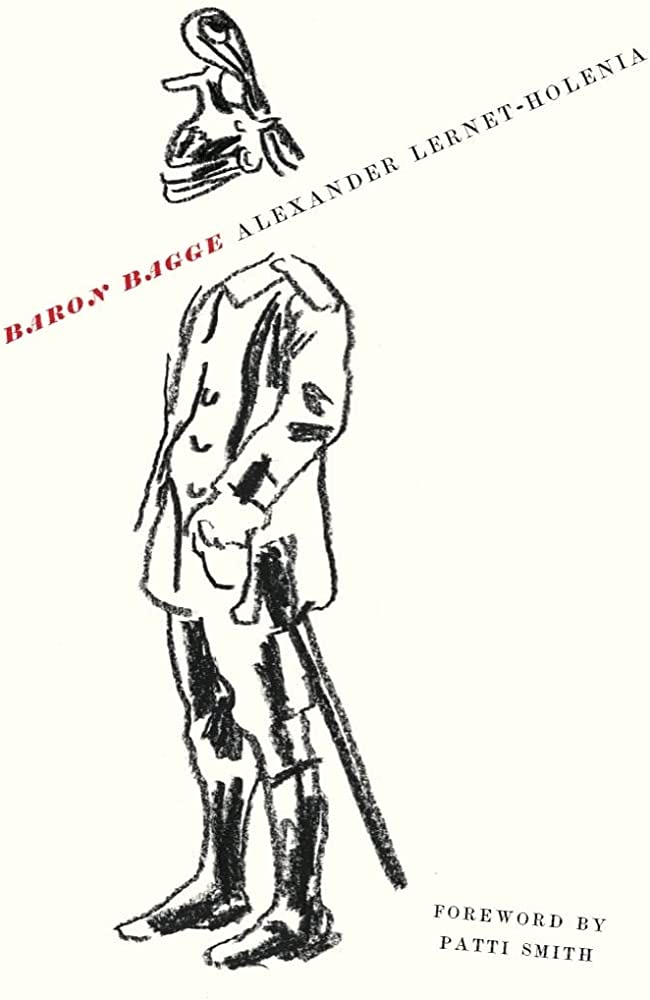
[New Directions; 2022]
Tr. from the German by Richard and Clara Winston
Love and death collide in the Carpathians during World War I in Alexander Lernet-Holenia’s surreal novella, Baron Bagge. A framing device wherein the main character and narrator, Baron Bagge, is challenged to a duel finds him relating his tale about a cavalry squadron flushing Russian troops out of Hungary in 1915 to his unnamed second. What follows is at first a diary of military movements and soldier archetypes—the hard-drinking American, the aloof captain, the too-young subordinate—before morphing into what is either a deftly presented paralysis stemming from PTSD, an attempt to render the path of a fallen soldier into the afterlife, or both.
To set up the story, Bagge’s memories of this time are shared like a military report:
Toward noon on February 26, the squadron was routed out and received orders to advance to the north as a reconnaissance detachment for the division and the army. For in retreating southward our troops had lost contact with the enemy, whose positions were now somewhere between us and the mountains. At the same time a squadron each from the other regiments received orders to proceed similarly toward the Carpathians on reconnaissance patrols, each at a certain distance from the others. The division was to follow soon afterward.
The formality of the little exposition Bagge provides is fitting not only given the context of war but also given his standing as an obedient aristocrat, indicated when Bagge shares that, “when the war started so unexpectedly, I was traveling in Central America—I had wanted to attend the opening of the Panama Canal.” It’s also hinted that his fellow officers don’t share his class; he is ranked just above two second lieutenants, one is a Kentuckian named Hamilton who provided the company with rare Scottish whiskey, and the other is “a very young fellow named Karl Maltitz,” who was “not at all manly” and seen as “still a child.” Then there is the captain, Herr von Semler-Wasserbeuburg, who, it is noted multiple times, does not hold his liquor very well. These rare details stand out primarily because there are only maybe six characters mentioned more than once.
But Lernet-Holenia’s dry scene-setting and spare character detail make way for his cinematic presentation of the battlefield scenes, like when the author indulges as much in the decorum of the proceedings, the “dress and arms,” as he does in the ominous imagery that surrounds the company as they cross the army’s front-line trenches and march into utter uncertainty: “The advance sentries looked after us in silence as we rode into the unknown, in style already belonging to times long past, and in dress and arms equally antiquated. Then the front lines were left behind, and the only signs of life were great flocks of raucous crows flying up out of the wasteland in front of the positions.”
As the squadron wanders the hilly terrain, Bagge grows skeptical of the captain’s persistence before they finally find some Russians, releasing the soldiers from “the monotonous strain of the ride.” As they chase the enemy toward a bridge, the tension mounts when soldiers and horses around Bagge are upended. He even takes a couple small knocks: “One pebble struck with a ringing sound against my helmet, the second against my chest, close to my left shoulder. Lucky these are not bullets, I thought.” Most make it through the skirmish on the bridge, form new battle lines, and charge the next small town, where more Russians are taken down until they retreat.
This is where all of the militaristic rigor of the first half melts away into the snowy haze. Earlier, Bagge claims that these “events had engraved every detail into my eyes with red-hot needles. I have forgotten nothing and will never forget, never!” But after crossing the bridge, he starts to forget, saying, “I could no longer remember the various facets of the skirmish; what had happened during the moments of hand-to-hand combat had already slipped my mind.” Then, Captain Semler doesn’t give Bagge any orders, though it’s unclear (even to Bagge himself) if he is in a state of post-traumatic shock or whether he has even survived the battle:
The time flew by for me in a curious dreamlike fashion . . . my impressions of what was going on around me did not follow in consecutive order. Rather, it seemed to me, I noticed things at considerable intervals, for each time I made another observation everything was a good deal farther along. I assumed that this odd state of mind was an aftereffect of the danger just past. I was still feeling a strange uncertainty as to whether I had survived the battle. But now I gradually began to recall details of the fighting; in fact, the remembrance took on more vividness than my observations of the present.
Bagge stumbles through the rest of the story in a state of bewilderment. They soon reach the village of Nagy Mihaly, where Bagge runs into his mother’s friends, the Szent-Kiraly’s. He knows little of this family except that they had an adolescent daughter the last time his mother saw them, leading Bagge’s mother to insist that the daughter “was already a pretty young thing and would come into no mean fortune,” and that “such a marriage would correspond exactly to her wishes.” It is easy to see it as wish fulfillment, then, when Bagge is immediately kissed on the lips by this daughter, Charlotte, before the pair can even confirm each other’s identity or exchange words. The romance that follows is bourgeois (respectful, earnest) and swift (they are married within two days, the whole town celebrating their happiness through the night).
The morning after the wedding, the squadron figuratively and literally marches into the fog of war, with Bagge himself, surrounded by the snow and his fellow soldiers, unsure of what exactly is happening and why. This awakens a realization in Bagge that he has been an unwilling participant throughout. From the beginning, he is massively inconvenienced when abandoning a Central American trip; he quietly harbors doubts about his captain’s decisions, then he reacts with disbelief and reluctance in the face of Charlotte’s love: She kisses him first, she professes her love for him first, and she sneaks into his room to spend the night in his bed.
Lernet-Holenia depicted a similar passivity in the brilliantly bleak Count Luna, reiterating here that when confronting the all-consuming conflict of war, failing to take your destiny into your own hands—whether by refusing the call to war, pushing back against the orders of an inscrutable superior, or questioning the inexplicable love of a women you have never met—is an act of self-destruction. It is an acknowledgement of defeat, whether by death or paralysis: “I thought I was suffering from a nightmare, and as in a dream, it suddenly seemed impossible for me to move, speak, or shout; rather I slavishly followed the procession of the others without taking any action of my own, though I constantly wanted to ask them what all this madness meant.”
Justin Stephani is an editor and writer living in Milwaukee.
This post may contain affiliate links.







